Sociology of Developing Countries: Foreign Aid's Impact on Rwanda
VerifiedAdded on 2020/05/16
|6
|1149
|141
Essay
AI Summary
This essay examines the impact of foreign aid on Rwanda, focusing on the sociological and economic effects within the context of a developing country. The paper discusses how foreign aid, often provided by developed nations and international organizations like the World Bank and IMF, influences Rwanda's political stability and economic development. The study analyzes the pledges made by the Rwandan government to donor countries, such as promoting democracy and improving social conditions, and the actual outcomes. It critiques the effectiveness of aid, especially in addressing poverty and inequality, highlighting concerns that aid may benefit a specific elite group, the Tutsi tribe, while marginalizing the Hutu population. The essay concludes that significant governmental changes and a re-evaluation of foreign aid policies are needed to ensure equitable distribution and sustainable development in Rwanda.
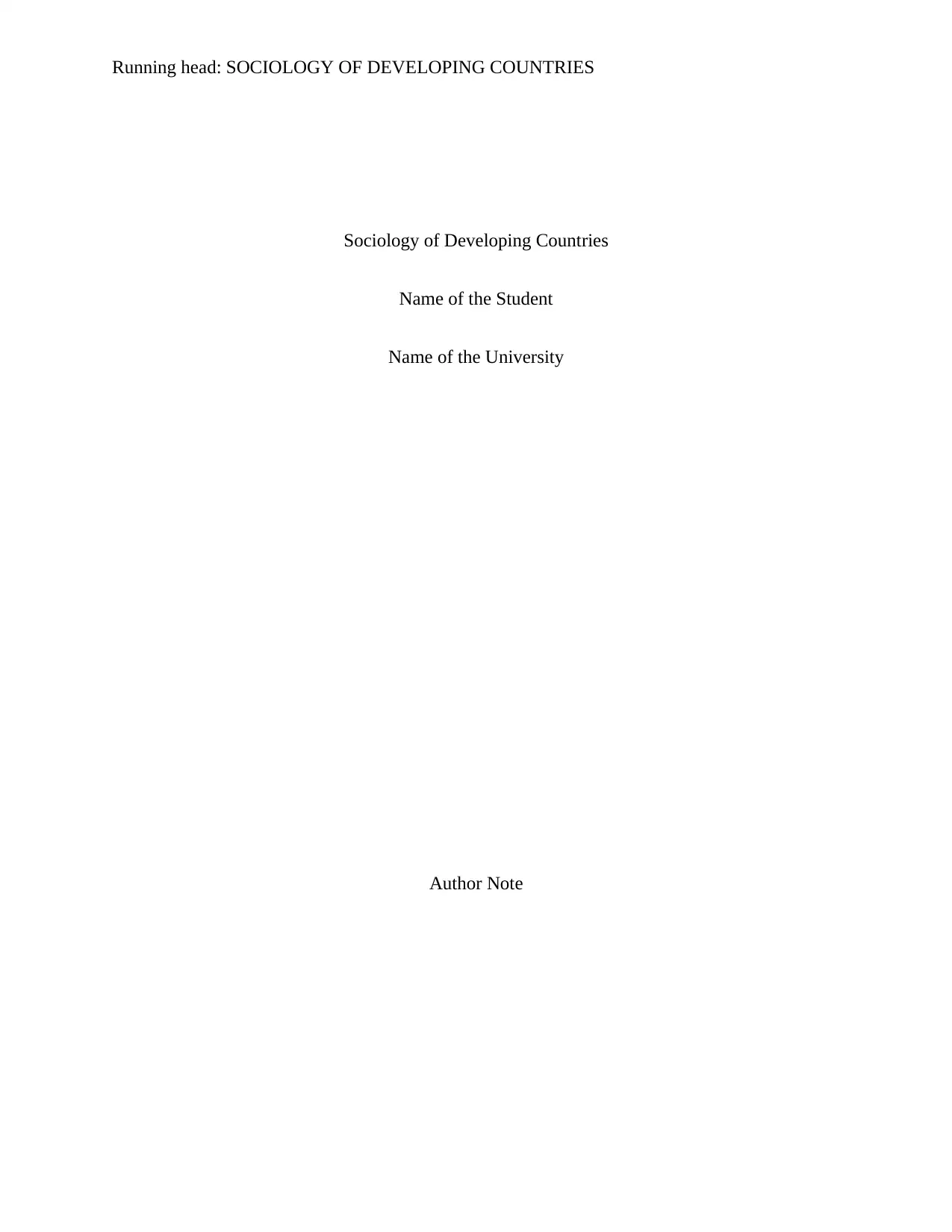
Running head: SOCIOLOGY OF DEVELOPING COUNTRIES
Sociology of Developing Countries
Name of the Student
Name of the University
Author Note
Sociology of Developing Countries
Name of the Student
Name of the University
Author Note
Paraphrase This Document
Need a fresh take? Get an instant paraphrase of this document with our AI Paraphraser
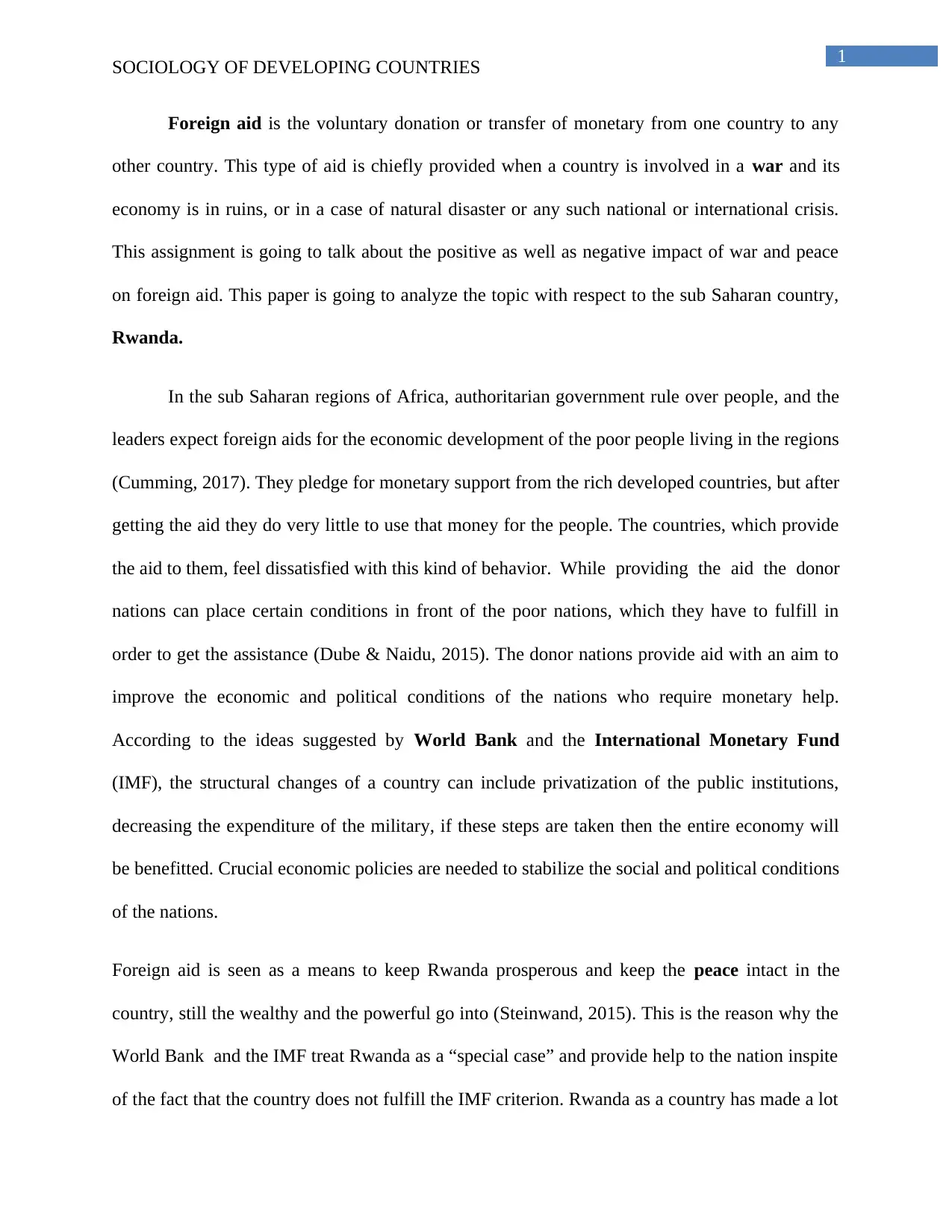
1
SOCIOLOGY OF DEVELOPING COUNTRIES
Foreign aid is the voluntary donation or transfer of monetary from one country to any
other country. This type of aid is chiefly provided when a country is involved in a war and its
economy is in ruins, or in a case of natural disaster or any such national or international crisis.
This assignment is going to talk about the positive as well as negative impact of war and peace
on foreign aid. This paper is going to analyze the topic with respect to the sub Saharan country,
Rwanda.
In the sub Saharan regions of Africa, authoritarian government rule over people, and the
leaders expect foreign aids for the economic development of the poor people living in the regions
(Cumming, 2017). They pledge for monetary support from the rich developed countries, but after
getting the aid they do very little to use that money for the people. The countries, which provide
the aid to them, feel dissatisfied with this kind of behavior. While providing the aid the donor
nations can place certain conditions in front of the poor nations, which they have to fulfill in
order to get the assistance (Dube & Naidu, 2015). The donor nations provide aid with an aim to
improve the economic and political conditions of the nations who require monetary help.
According to the ideas suggested by World Bank and the International Monetary Fund
(IMF), the structural changes of a country can include privatization of the public institutions,
decreasing the expenditure of the military, if these steps are taken then the entire economy will
be benefitted. Crucial economic policies are needed to stabilize the social and political conditions
of the nations.
Foreign aid is seen as a means to keep Rwanda prosperous and keep the peace intact in the
country, still the wealthy and the powerful go into (Steinwand, 2015). This is the reason why the
World Bank and the IMF treat Rwanda as a “special case” and provide help to the nation inspite
of the fact that the country does not fulfill the IMF criterion. Rwanda as a country has made a lot
SOCIOLOGY OF DEVELOPING COUNTRIES
Foreign aid is the voluntary donation or transfer of monetary from one country to any
other country. This type of aid is chiefly provided when a country is involved in a war and its
economy is in ruins, or in a case of natural disaster or any such national or international crisis.
This assignment is going to talk about the positive as well as negative impact of war and peace
on foreign aid. This paper is going to analyze the topic with respect to the sub Saharan country,
Rwanda.
In the sub Saharan regions of Africa, authoritarian government rule over people, and the
leaders expect foreign aids for the economic development of the poor people living in the regions
(Cumming, 2017). They pledge for monetary support from the rich developed countries, but after
getting the aid they do very little to use that money for the people. The countries, which provide
the aid to them, feel dissatisfied with this kind of behavior. While providing the aid the donor
nations can place certain conditions in front of the poor nations, which they have to fulfill in
order to get the assistance (Dube & Naidu, 2015). The donor nations provide aid with an aim to
improve the economic and political conditions of the nations who require monetary help.
According to the ideas suggested by World Bank and the International Monetary Fund
(IMF), the structural changes of a country can include privatization of the public institutions,
decreasing the expenditure of the military, if these steps are taken then the entire economy will
be benefitted. Crucial economic policies are needed to stabilize the social and political conditions
of the nations.
Foreign aid is seen as a means to keep Rwanda prosperous and keep the peace intact in the
country, still the wealthy and the powerful go into (Steinwand, 2015). This is the reason why the
World Bank and the IMF treat Rwanda as a “special case” and provide help to the nation inspite
of the fact that the country does not fulfill the IMF criterion. Rwanda as a country has made a lot
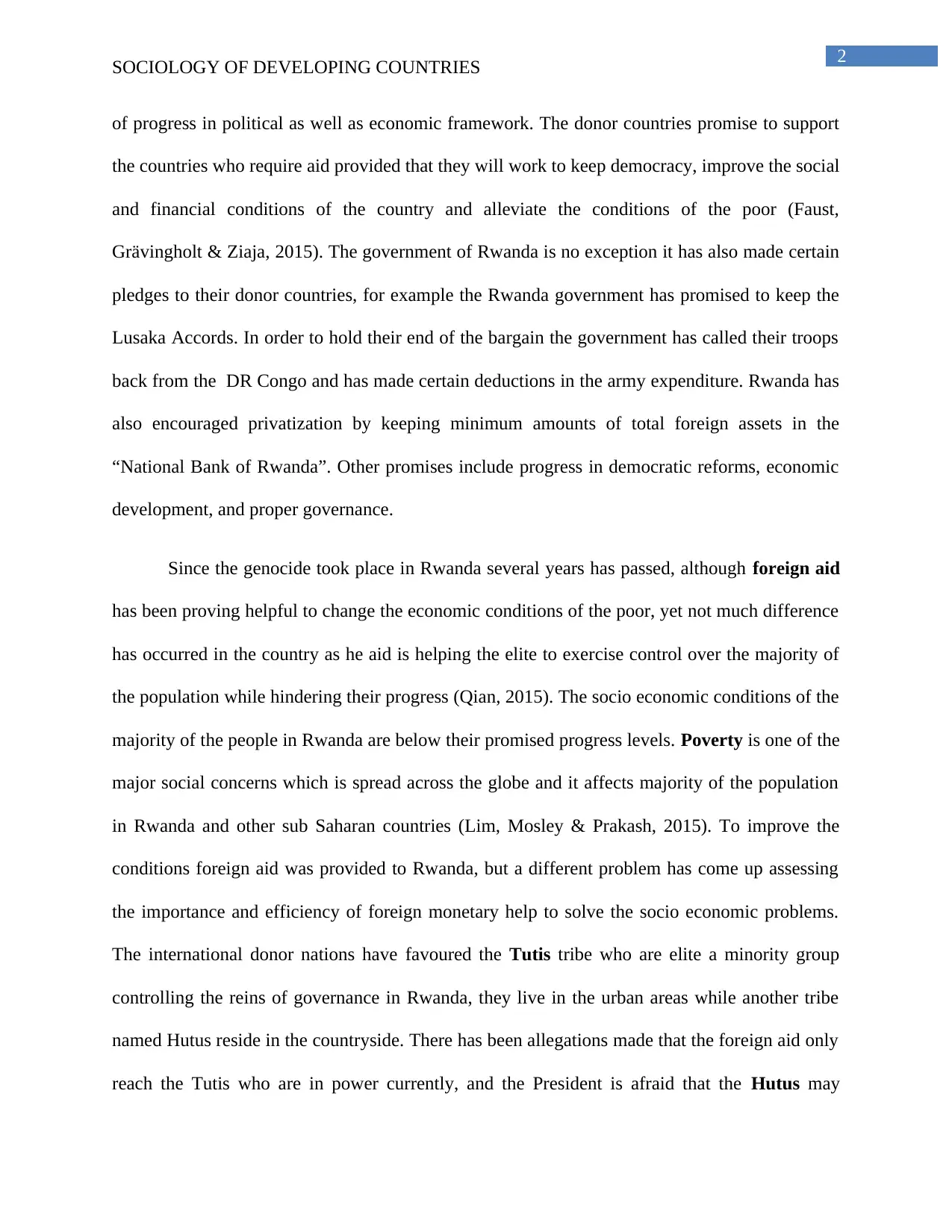
2
SOCIOLOGY OF DEVELOPING COUNTRIES
of progress in political as well as economic framework. The donor countries promise to support
the countries who require aid provided that they will work to keep democracy, improve the social
and financial conditions of the country and alleviate the conditions of the poor (Faust,
Grävingholt & Ziaja, 2015). The government of Rwanda is no exception it has also made certain
pledges to their donor countries, for example the Rwanda government has promised to keep the
Lusaka Accords. In order to hold their end of the bargain the government has called their troops
back from the DR Congo and has made certain deductions in the army expenditure. Rwanda has
also encouraged privatization by keeping minimum amounts of total foreign assets in the
“National Bank of Rwanda”. Other promises include progress in democratic reforms, economic
development, and proper governance.
Since the genocide took place in Rwanda several years has passed, although foreign aid
has been proving helpful to change the economic conditions of the poor, yet not much difference
has occurred in the country as he aid is helping the elite to exercise control over the majority of
the population while hindering their progress (Qian, 2015). The socio economic conditions of the
majority of the people in Rwanda are below their promised progress levels. Poverty is one of the
major social concerns which is spread across the globe and it affects majority of the population
in Rwanda and other sub Saharan countries (Lim, Mosley & Prakash, 2015). To improve the
conditions foreign aid was provided to Rwanda, but a different problem has come up assessing
the importance and efficiency of foreign monetary help to solve the socio economic problems.
The international donor nations have favoured the Tutis tribe who are elite a minority group
controlling the reins of governance in Rwanda, they live in the urban areas while another tribe
named Hutus reside in the countryside. There has been allegations made that the foreign aid only
reach the Tutis who are in power currently, and the President is afraid that the Hutus may
SOCIOLOGY OF DEVELOPING COUNTRIES
of progress in political as well as economic framework. The donor countries promise to support
the countries who require aid provided that they will work to keep democracy, improve the social
and financial conditions of the country and alleviate the conditions of the poor (Faust,
Grävingholt & Ziaja, 2015). The government of Rwanda is no exception it has also made certain
pledges to their donor countries, for example the Rwanda government has promised to keep the
Lusaka Accords. In order to hold their end of the bargain the government has called their troops
back from the DR Congo and has made certain deductions in the army expenditure. Rwanda has
also encouraged privatization by keeping minimum amounts of total foreign assets in the
“National Bank of Rwanda”. Other promises include progress in democratic reforms, economic
development, and proper governance.
Since the genocide took place in Rwanda several years has passed, although foreign aid
has been proving helpful to change the economic conditions of the poor, yet not much difference
has occurred in the country as he aid is helping the elite to exercise control over the majority of
the population while hindering their progress (Qian, 2015). The socio economic conditions of the
majority of the people in Rwanda are below their promised progress levels. Poverty is one of the
major social concerns which is spread across the globe and it affects majority of the population
in Rwanda and other sub Saharan countries (Lim, Mosley & Prakash, 2015). To improve the
conditions foreign aid was provided to Rwanda, but a different problem has come up assessing
the importance and efficiency of foreign monetary help to solve the socio economic problems.
The international donor nations have favoured the Tutis tribe who are elite a minority group
controlling the reins of governance in Rwanda, they live in the urban areas while another tribe
named Hutus reside in the countryside. There has been allegations made that the foreign aid only
reach the Tutis who are in power currently, and the President is afraid that the Hutus may
⊘ This is a preview!⊘
Do you want full access?
Subscribe today to unlock all pages.

Trusted by 1+ million students worldwide
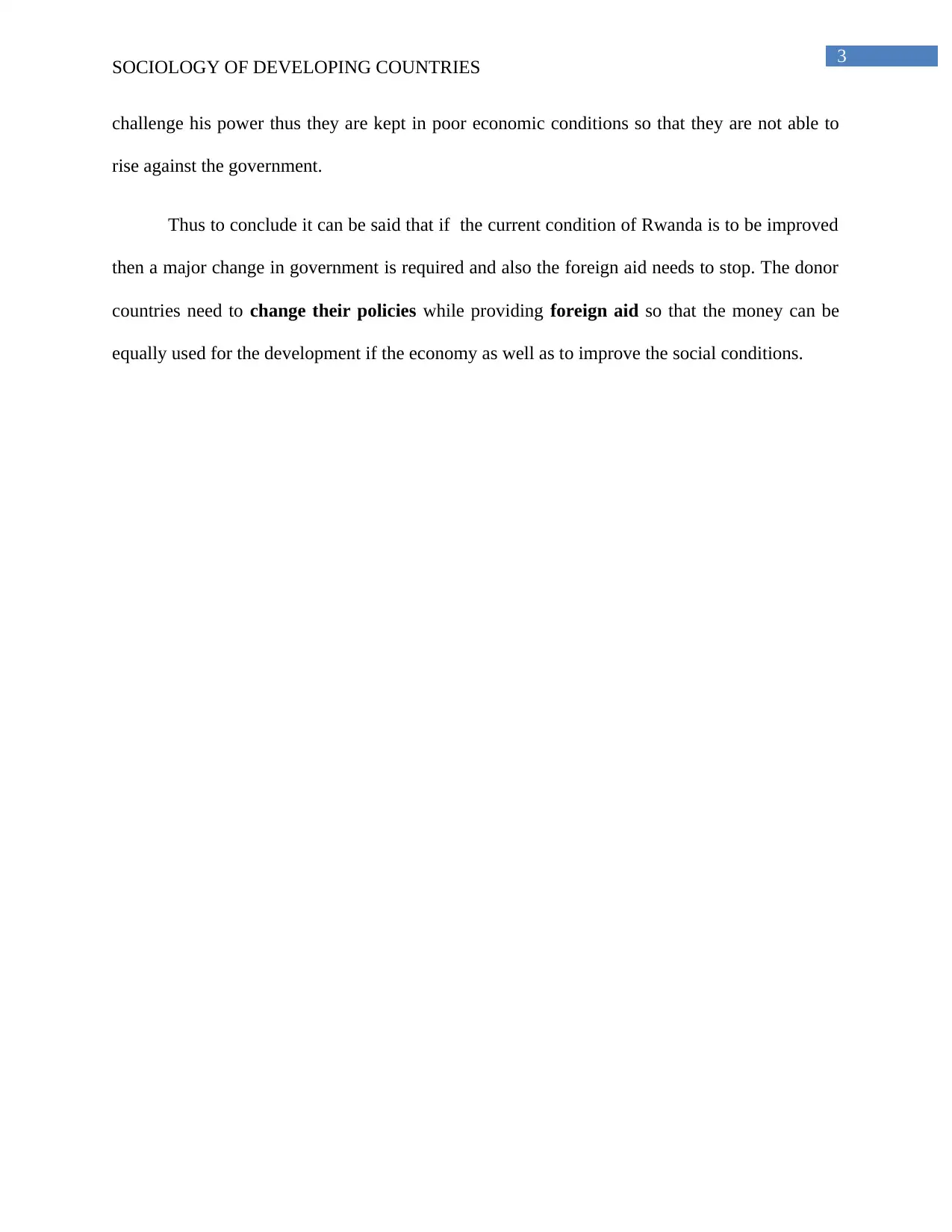
3
SOCIOLOGY OF DEVELOPING COUNTRIES
challenge his power thus they are kept in poor economic conditions so that they are not able to
rise against the government.
Thus to conclude it can be said that if the current condition of Rwanda is to be improved
then a major change in government is required and also the foreign aid needs to stop. The donor
countries need to change their policies while providing foreign aid so that the money can be
equally used for the development if the economy as well as to improve the social conditions.
SOCIOLOGY OF DEVELOPING COUNTRIES
challenge his power thus they are kept in poor economic conditions so that they are not able to
rise against the government.
Thus to conclude it can be said that if the current condition of Rwanda is to be improved
then a major change in government is required and also the foreign aid needs to stop. The donor
countries need to change their policies while providing foreign aid so that the money can be
equally used for the development if the economy as well as to improve the social conditions.
Paraphrase This Document
Need a fresh take? Get an instant paraphrase of this document with our AI Paraphraser
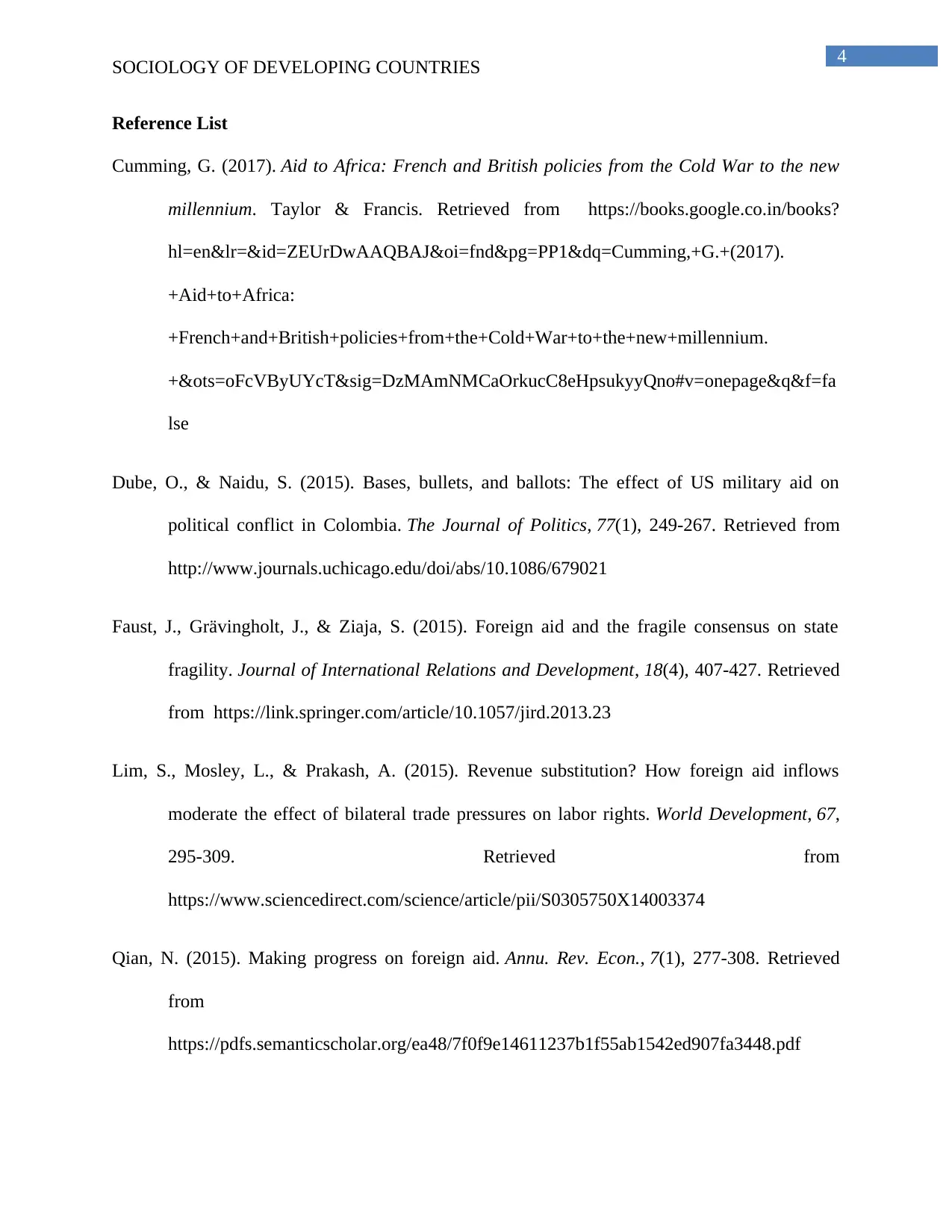
4
SOCIOLOGY OF DEVELOPING COUNTRIES
Reference List
Cumming, G. (2017). Aid to Africa: French and British policies from the Cold War to the new
millennium. Taylor & Francis. Retrieved from https://books.google.co.in/books?
hl=en&lr=&id=ZEUrDwAAQBAJ&oi=fnd&pg=PP1&dq=Cumming,+G.+(2017).
+Aid+to+Africa:
+French+and+British+policies+from+the+Cold+War+to+the+new+millennium.
+&ots=oFcVByUYcT&sig=DzMAmNMCaOrkucC8eHpsukyyQno#v=onepage&q&f=fa
lse
Dube, O., & Naidu, S. (2015). Bases, bullets, and ballots: The effect of US military aid on
political conflict in Colombia. The Journal of Politics, 77(1), 249-267. Retrieved from
http://www.journals.uchicago.edu/doi/abs/10.1086/679021
Faust, J., Grävingholt, J., & Ziaja, S. (2015). Foreign aid and the fragile consensus on state
fragility. Journal of International Relations and Development, 18(4), 407-427. Retrieved
from https://link.springer.com/article/10.1057/jird.2013.23
Lim, S., Mosley, L., & Prakash, A. (2015). Revenue substitution? How foreign aid inflows
moderate the effect of bilateral trade pressures on labor rights. World Development, 67,
295-309. Retrieved from
https://www.sciencedirect.com/science/article/pii/S0305750X14003374
Qian, N. (2015). Making progress on foreign aid. Annu. Rev. Econ., 7(1), 277-308. Retrieved
from
https://pdfs.semanticscholar.org/ea48/7f0f9e14611237b1f55ab1542ed907fa3448.pdf
SOCIOLOGY OF DEVELOPING COUNTRIES
Reference List
Cumming, G. (2017). Aid to Africa: French and British policies from the Cold War to the new
millennium. Taylor & Francis. Retrieved from https://books.google.co.in/books?
hl=en&lr=&id=ZEUrDwAAQBAJ&oi=fnd&pg=PP1&dq=Cumming,+G.+(2017).
+Aid+to+Africa:
+French+and+British+policies+from+the+Cold+War+to+the+new+millennium.
+&ots=oFcVByUYcT&sig=DzMAmNMCaOrkucC8eHpsukyyQno#v=onepage&q&f=fa
lse
Dube, O., & Naidu, S. (2015). Bases, bullets, and ballots: The effect of US military aid on
political conflict in Colombia. The Journal of Politics, 77(1), 249-267. Retrieved from
http://www.journals.uchicago.edu/doi/abs/10.1086/679021
Faust, J., Grävingholt, J., & Ziaja, S. (2015). Foreign aid and the fragile consensus on state
fragility. Journal of International Relations and Development, 18(4), 407-427. Retrieved
from https://link.springer.com/article/10.1057/jird.2013.23
Lim, S., Mosley, L., & Prakash, A. (2015). Revenue substitution? How foreign aid inflows
moderate the effect of bilateral trade pressures on labor rights. World Development, 67,
295-309. Retrieved from
https://www.sciencedirect.com/science/article/pii/S0305750X14003374
Qian, N. (2015). Making progress on foreign aid. Annu. Rev. Econ., 7(1), 277-308. Retrieved
from
https://pdfs.semanticscholar.org/ea48/7f0f9e14611237b1f55ab1542ed907fa3448.pdf
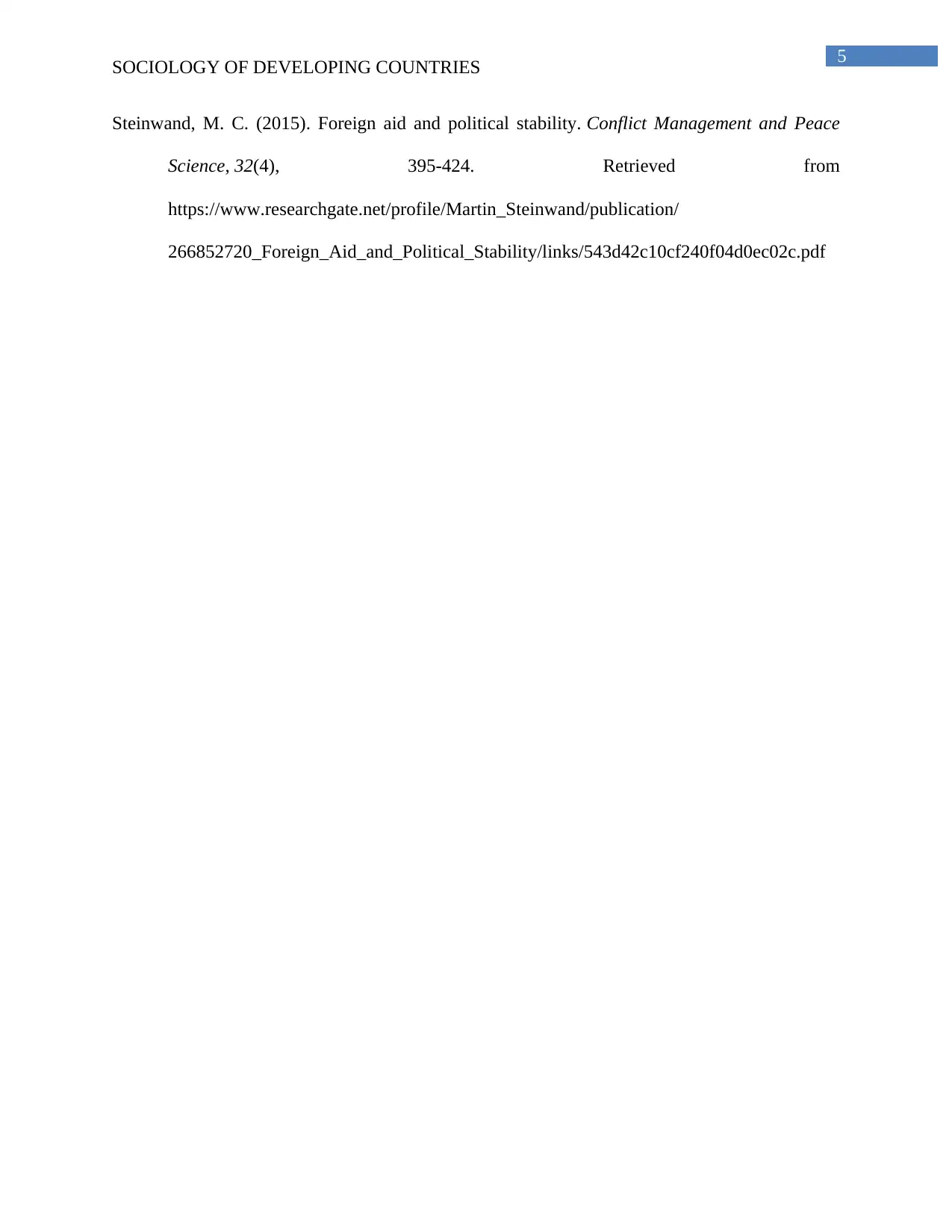
5
SOCIOLOGY OF DEVELOPING COUNTRIES
Steinwand, M. C. (2015). Foreign aid and political stability. Conflict Management and Peace
Science, 32(4), 395-424. Retrieved from
https://www.researchgate.net/profile/Martin_Steinwand/publication/
266852720_Foreign_Aid_and_Political_Stability/links/543d42c10cf240f04d0ec02c.pdf
SOCIOLOGY OF DEVELOPING COUNTRIES
Steinwand, M. C. (2015). Foreign aid and political stability. Conflict Management and Peace
Science, 32(4), 395-424. Retrieved from
https://www.researchgate.net/profile/Martin_Steinwand/publication/
266852720_Foreign_Aid_and_Political_Stability/links/543d42c10cf240f04d0ec02c.pdf
⊘ This is a preview!⊘
Do you want full access?
Subscribe today to unlock all pages.

Trusted by 1+ million students worldwide
1 out of 6
Related Documents
Your All-in-One AI-Powered Toolkit for Academic Success.
+13062052269
info@desklib.com
Available 24*7 on WhatsApp / Email
![[object Object]](/_next/static/media/star-bottom.7253800d.svg)
Unlock your academic potential
Copyright © 2020–2025 A2Z Services. All Rights Reserved. Developed and managed by ZUCOL.




